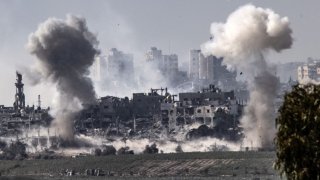
- Israel has significantly stepped up its ground invasion over recent days.
- This follows the terror attack by Palestinian militant group Hamas on Oct. 7 in southern Israel that killed approximately 1,200 people and saw more than 240 taken hostage.
- Home to 2.3 million people and roughly twice the size of Washington, D.C., the Gaza Strip is considered one of the most densely populated areas in the world.
- The Israel Defense Forces say they warn civilians to leave ahead of bombings, and that they target areas based on where Hamas positions are located.
Every day in the Gaza Strip brings desperate uncertainty as the war intensifies, Palestinian residents told CNBC.
In late October, Israel's Prime Minister Benjamin Netanyahu confirmed a ground operation had begun in Gaza with forces pushing deep into the territory in recent weeks. This follows the terror attack by Palestinian militant group Hamas on Oct. 7 in southern Israel that killed approximately 1,200 people and saw more than 240 taken hostage.
"The nights are the scariest and longest as the bombs rain over Gaza continuously. We don't know when our turn is, but we expect to get bombed any minute," Shouq Al Najjar, a 28-year-old development worker in Gaza, told CNBC.
Get New England news, weather forecasts and entertainment stories to your inbox. Sign up for NECN newsletters.
Najjar had to flee her neighborhood with her husband after their home was bombed, heading to Khan Younis in the south of Gaza — a city where Israeli forces told Palestinian civilians to evacuate to. Despite this, Israeli bombings have continued in several parts of southern Gaza, including Khan Younis.
Najjar is currently staying with her husband in a crowded house with several other relatives and children, and food and water is running out. "We are witnessing the unimaginable. We're living in constant fear, and survival feels uncertain," she told CNBC.
Home to 2.3 million people and roughly twice the size of Washington, D.C., the Gaza Strip is considered one of the most densely populated areas in the world. It's been subject to a land, air, and sea blockade imposed by Israel for over 16 years which has severely restricted residents' freedoms, and led Human Rights Watch and the United Nations to call it an "open-air prison."
Money Report
Israel imposed the blockade after the Palestinian militant group Hamas took over the territory in 2007, saying it was doing so for the safety of Israelis. Hamas has not held an election in Gaza since its initial victory in 2006. The U.N. classifies Israel as an occupier state over the Palestinian territories of the West Bank and Gaza.
Mounting deaths
With the death toll rising by the day, the Israeli government has warned this will be a "long war" against Hamas. Over 11,000 Palestinian people have been killed in the besieged enclave, according to the Hamas-run health authority. More children have been killed in Gaza in just four weeks than in any other global conflict since 2019, according to Save the Children.
Netanyahu has said its military will not stop until it eradicates Hamas, and he has rejected international calls for a cease-fire. The Israel Defense Forces (IDF) says it does not target civilians, and accuses Hamas of building an underground network of tunnels below critical civilian facilities and of using Palestinians as human shields.
"After the first five days of the aggression, the [Israeli] army ordered everyone in Gaza City and North Gaza to evacuate to the south. Then they targeted the areas which Palestinians evacuated to," 58-year-old Sami Zakout, deputy director at the Mezan Centre for Human Rights, a non-partisan, non-governmental human rights organization based in the Gaza Strip, told CNBC. He was speaking via voice note in Rafah, near the single exit point out of the Gaza Strip that is not controlled by Israel.
Zakout and his family fled their home in Gaza City to Rafah, which borders Egypt. He said that other people who tried to escape were killed, although CNBC could not verify that information.
"It's the first time that I witness this kind of genocide. It's really a genocide. Especially when they are using warplanes and huge bombs that target civil buildings and civilians," Zakout said. An IDF spokesperson responded to CNBC saying Israel follows international law and takes feasible precautions to mitigate civilian harm.
Zakout argued that Israel's justifications for targeting Hamas in civilian areas were untrue. "They say there is a Hamas leader hiding with us, but the people in Gaza know it's a lie. There is no position for Hamas on the ground. They are underground in tunnels and nobody knows where they are."
The IDF says it warns civilians to leave ahead of its bombings, and that it targets areas based on where Hamas positions are located.
Zakout is one of around 1.5 million people in Gaza to have been displaced, according to the World Health Organization.
"A humanitarian ceasefire is needed now to bring some respite to people, to help scale up our humanitarian operations and to continue to respond to the huge and immense population," Juliette Touma, director of communications for the United Nations Relief and Works Agency for Palestinian Refugees, told CNBC.
Medical treatment by cell phone light
Palestinian doctors in Gaza are also struggling to keep up with the heavy inflows of patients, and some hospitals have run out of fuel and medicine, according to the WHO and the Palestinian Red Crescent Society.
Gaza's largest hospital, al-Shifa, is no longer functioning, according to the UN, and the only hospital offering cancer treatment, the Turkish-Palestinian Friendship Hospital, has also run out of fuel, according to its director.
Doctors are performing surgeries without anesthesia, according to British-Palestinian doctor Ghassan Abu Sitta.
A surgeon volunteering in Gaza, Sitta, alleged that the Israeli army is using white phosphorus in civilian areas. He said that he treated a 12-year-old with third-degree burns that penetrated the bone.
"I treated a female patient with a huge thigh wound that was contaminated with chemicals. Half of the procedure was done using light from mobile phones," Sitta told CNBC from al-Ahli Baptist Hospital.
White phosphorus can cause severe burns and penetrate through bone, according to the World Health Organization, and can reignite even after treatment. Amnesty International and Human Rights Watch have accused Israel of using white phosphorus artillery shells over the Gaza City port and the Israel-Lebanon border.
In an emailed statement to CNBC, the IDF said that while most of the army's artillery munitions don't contain phosphorus, some do. "Other smoke-screen shells, with white phosphorus, are not unlawful and many Western militaries possess them, including the IDF," the statement read.
The use of white phosphorus in densely populated areas violates international humanitarian law, according to the U.N.
which requires precautions to avoid civilian deaths. Israeli officials have denied targeting civilian areas with the chemical substance.
"IDF procedures require that such shells are not used in densely populated areas, subject to certain exceptions," the IDF told CNBC. "This complies and goes beyond the requirements of international law. The IDF does not use such shells for purposes of targeting or setting fire."






